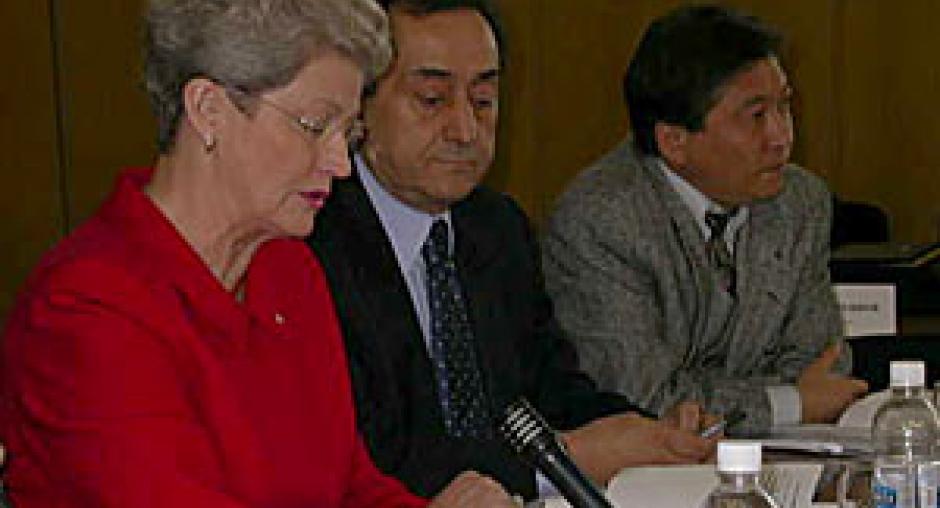Newsroom
OSCE PA delegation participates in seminar on constitutional reform in Kyrgyzstan
BISHKEK 6 December 2002

(OSCE)Finnish MP Paula Kokkonen, Ambassador Aydin Idil, Head of the OSCE Centre in Bishkek and A. Kakeev, Rector of the Kyrgyz National University, Bishkek, 6 December 2002. (OSCE) Photo details
BISHKEK, 6 December 2002 - The ongoing public discussion on imminent changes of Kyrgyzstan's constitution was the background of a one-day seminar held in the country's capital, Bishkek, on 3 December. A delegation of the OSCE Parliamentary Assembly from eight OSCE participating States, who was visiting the country between 1 and 4 December, participated in the seminar.
Entitled "Processes of Constitutional Reform in the Kyrgyz Republic", the event aimed at providing a forum for academic circles to discuss constitutional reform processes and to produce recommendations for the draft amendments. The participating academics, state officials and representatives of non-governmental and international organizations and embassies compared the development of the constitutional basis of the Kyrgyz Republic with similar processes in European countries.
In their contributions they focused on the governmental power, the transfer of power from the President to Parliament, the influence of civil society, and the role of the local self-government in building a constitutional state. Special emphasize was given to the significance of the constitution of 1993 as a basis for this process.
In his address to the seminar attendees, Nurlan Alymbaev, Kyrgyzstan's Deputy Minister of Justice, emphasized the importance of the participation of citizens and civil society organizations in the discussion on the amendments suggested by the Constitutional Council, which has recently been established by the Kyrgyz President. "This has become obvious by the huge amount of recommendations and comments received by this council during the last weeks", he said. A result of this development was the prolongation of the public discussion process until 2 January 2003 and the postponement of the referendum on the constitution amendments by the country's president, Askar Akaev, until late January 2003.
"We welcome the constitutional reforms in Kyrgzstan since it involves a nationwide dialogue on the Constitution, a document which embodies the political principles of the country", said Paula Kokkonen, a Finnish member of Parliament and the head of the OSCE PA delegation in her speech. "Such a dialogue could contribute to the healing of wounds the country suffered in the recent past."
"With regard to the referendum, it needs to be emphasized that, besides the acceptance of a new constitution by the population, success very much depends on the institutions which have to implement and defend the principles laid down in such a document", Ms. Kokkonen said. She also pointed out that division of power as well as free and fair elections are one of the cornerstones of democratic countries.
Several other members of the OSCE PA delegation shared with the seminar participants their experience of drafting and amending constitutions as well as views on the political culture in their respective countries.
The event was organized by the Kyrgyz State National University and the NGO "Democratic Processes Research Center". It was supported by the OSCE Centre in Bishkek.
Entitled "Processes of Constitutional Reform in the Kyrgyz Republic", the event aimed at providing a forum for academic circles to discuss constitutional reform processes and to produce recommendations for the draft amendments. The participating academics, state officials and representatives of non-governmental and international organizations and embassies compared the development of the constitutional basis of the Kyrgyz Republic with similar processes in European countries.
In their contributions they focused on the governmental power, the transfer of power from the President to Parliament, the influence of civil society, and the role of the local self-government in building a constitutional state. Special emphasize was given to the significance of the constitution of 1993 as a basis for this process.
In his address to the seminar attendees, Nurlan Alymbaev, Kyrgyzstan's Deputy Minister of Justice, emphasized the importance of the participation of citizens and civil society organizations in the discussion on the amendments suggested by the Constitutional Council, which has recently been established by the Kyrgyz President. "This has become obvious by the huge amount of recommendations and comments received by this council during the last weeks", he said. A result of this development was the prolongation of the public discussion process until 2 January 2003 and the postponement of the referendum on the constitution amendments by the country's president, Askar Akaev, until late January 2003.
"We welcome the constitutional reforms in Kyrgzstan since it involves a nationwide dialogue on the Constitution, a document which embodies the political principles of the country", said Paula Kokkonen, a Finnish member of Parliament and the head of the OSCE PA delegation in her speech. "Such a dialogue could contribute to the healing of wounds the country suffered in the recent past."
"With regard to the referendum, it needs to be emphasized that, besides the acceptance of a new constitution by the population, success very much depends on the institutions which have to implement and defend the principles laid down in such a document", Ms. Kokkonen said. She also pointed out that division of power as well as free and fair elections are one of the cornerstones of democratic countries.
Several other members of the OSCE PA delegation shared with the seminar participants their experience of drafting and amending constitutions as well as views on the political culture in their respective countries.
The event was organized by the Kyrgyz State National University and the NGO "Democratic Processes Research Center". It was supported by the OSCE Centre in Bishkek.
